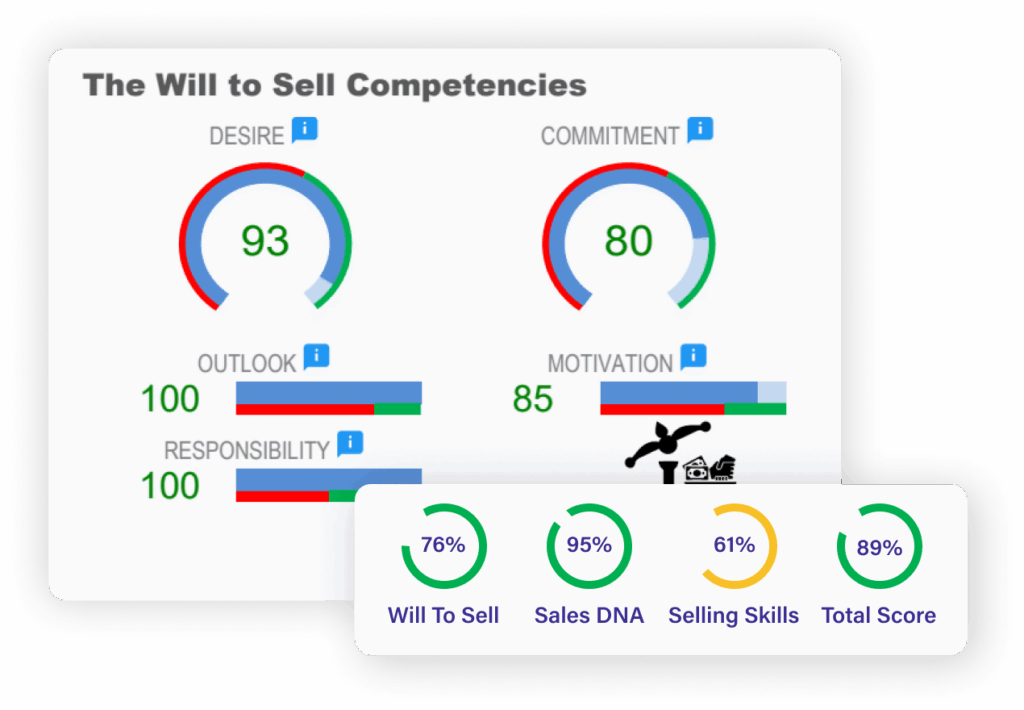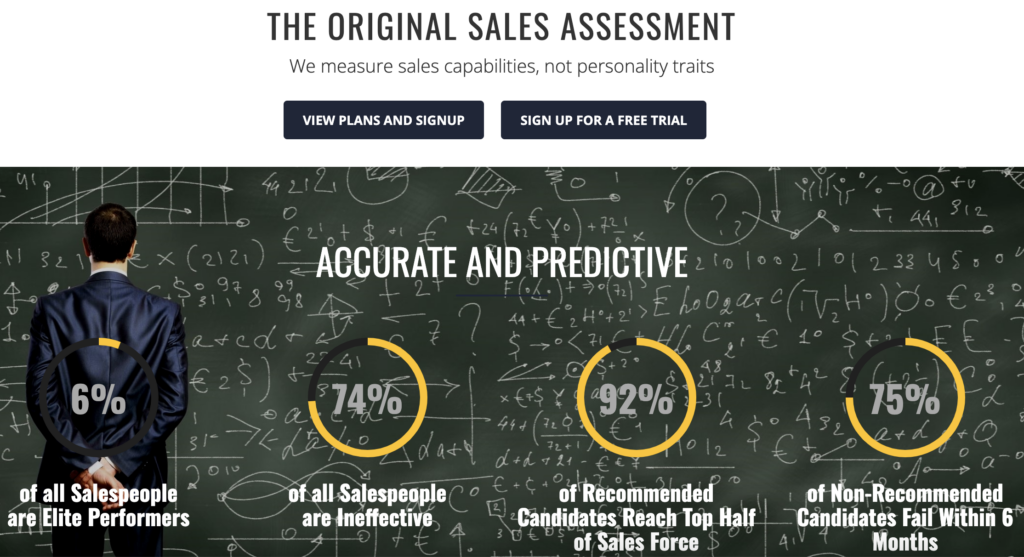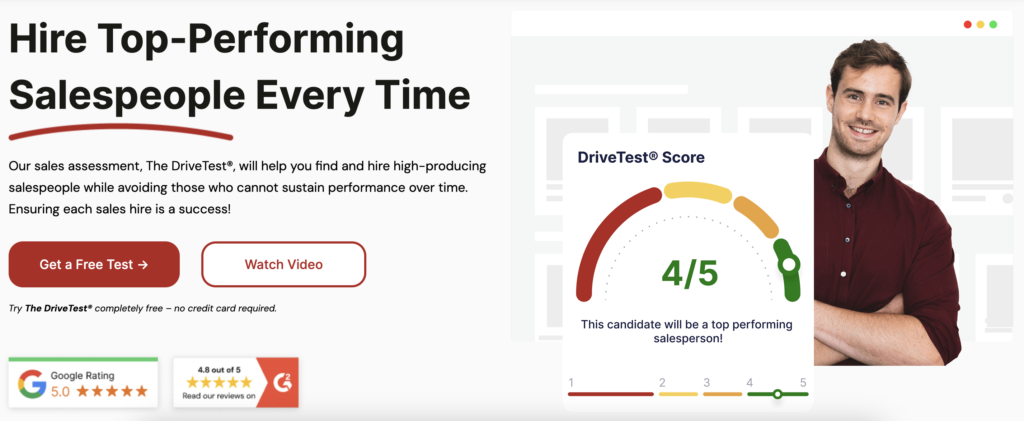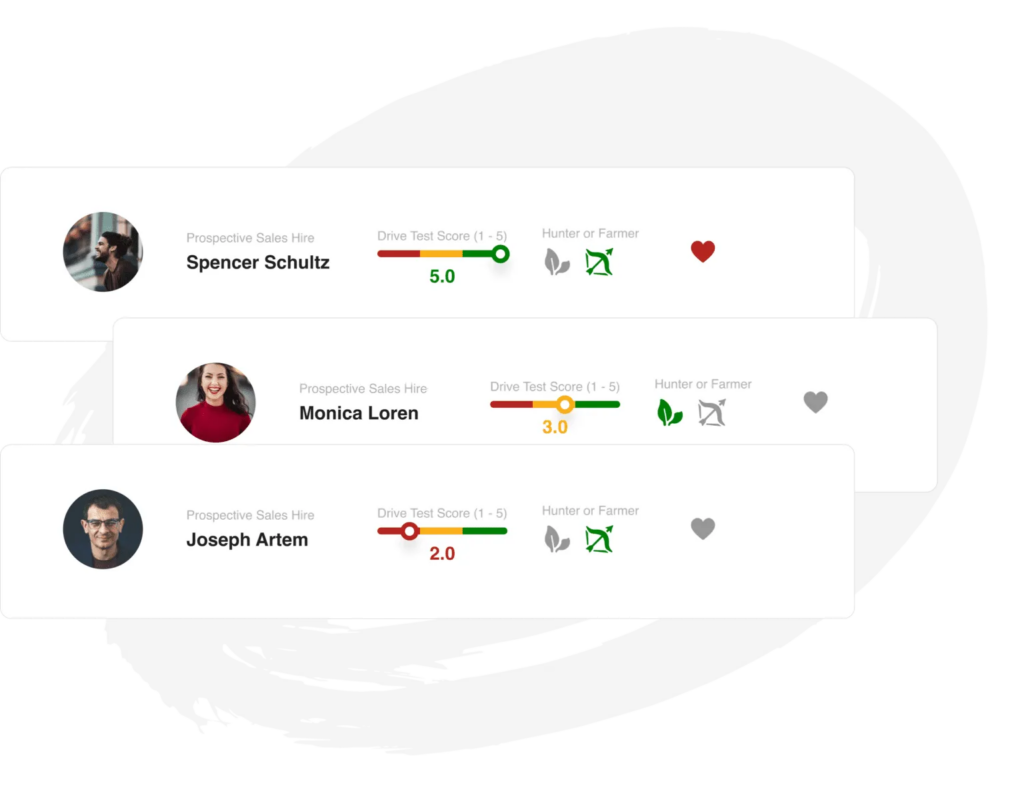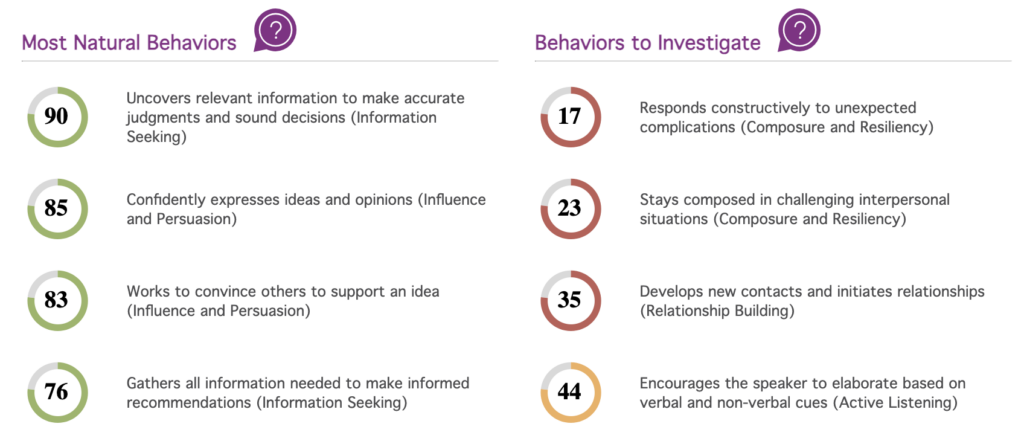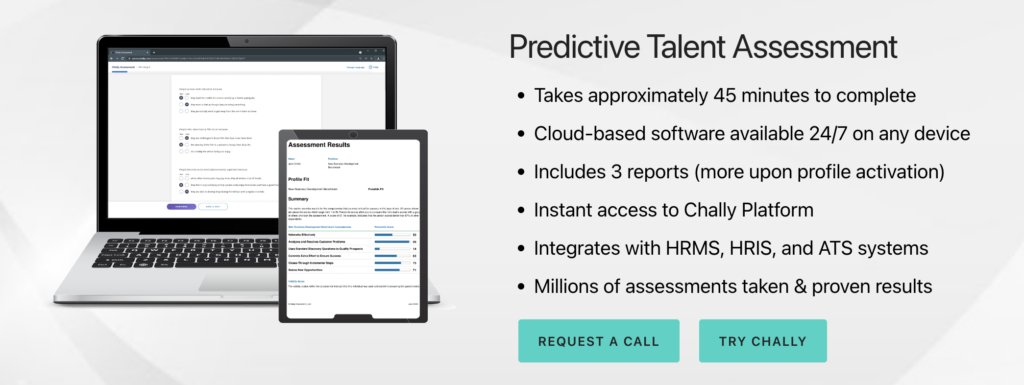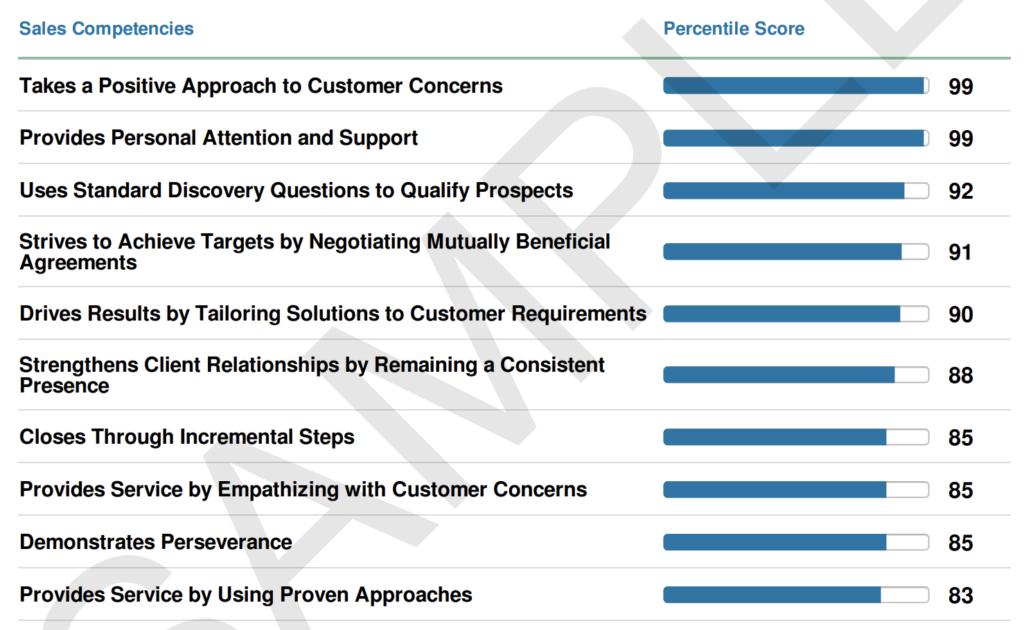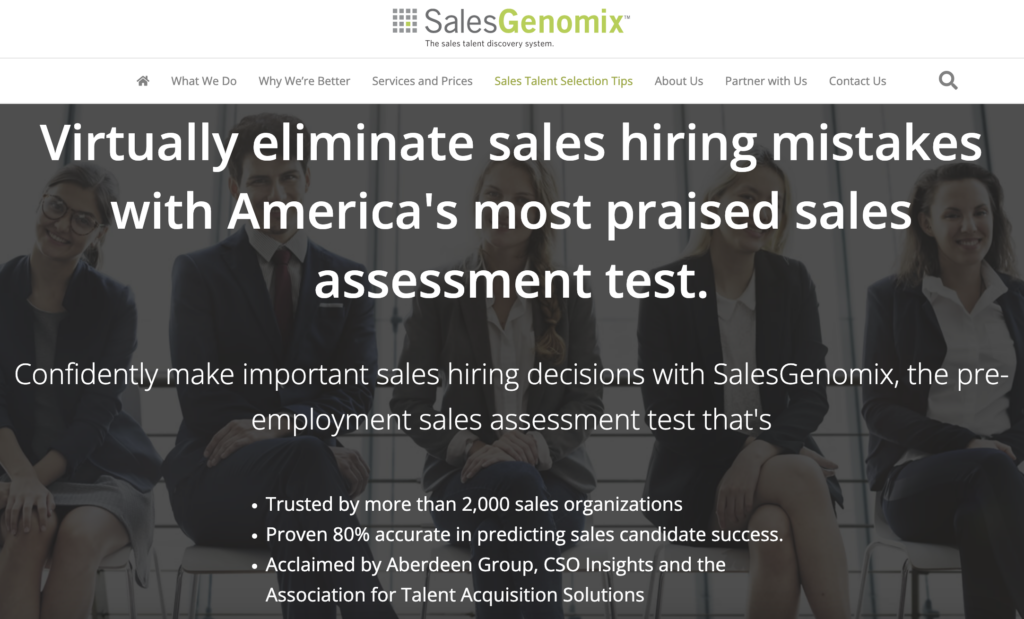Today’s sales industry is more competitive than ever, and you can bet that your competitors are leveraging every tool they can to find the best and brightest candidates. As such, you can’t expect to build a winning sales team with intuition alone. A key component of winning the competitive battle is gaining data-driven insights from sales assessments.
What Exactly Are Sales Assessments?
A sales assessment provides a standardized framework for objectively analyzing the capabilities of potential candidates. It allows you to look at things like hard and soft skills, strengths, weaknesses, and cultural fit, so you can determine how likely someone would be to succeed on your sales team.
Here’s a formal definition from Vaia.
“A sales assessment is a structured evaluation designed to measure the skills, competencies, and potential of sales professionals, helping businesses identify strengths and areas for improvement within their teams. It typically includes a series of tests and exercises such as role-playing scenarios, behavioral interviews, and knowledge-based quizzes to assess various aspects like communication, negotiation, and closing skills. Implementing a sales assessment allows companies to optimize their sales force, enhance performance, and increase revenue by ensuring the right fit for every role.”
Here’s an example of what a sales assessment looks like when measuring the will to sell.
Why Traditional Hiring Techniques No Longer Cut It
For many sales recruiters in the past, their ultimate decisions were often based on gut feelings. And while instinct certainly still has value and you don’t want to blindly trust any old data, relying on “a hunch” carries a high level of risk. According to research, “Most hiring decisions are made intuitively, in only four minutes — with 75% of those hires resulting in costly mis-hires.”
This is due to several reasons, including a natural unconscious bias that humans can’t completely escape, limited insight, and the inability to completely understand a candidate’s true talent based on a resume and interview. Also, if a candidate is highly charismatic, it’s easy to choose them over another more qualified candidate, even if they’re not actually the best fit.
But with many modern sales assessments implementing cutting-edge technology, there’s no reason to take a chance.
Practical Use Cases for Sales Assessments in Modern Hiring
Objectively Analyze Core Competencies – Perhaps the biggest reason to use sales assessments is that you can gain in-depth insights into the core competencies that are most critical to being a successful salesperson on your specific team. For instance, the Sales Skills Assessment evaluates 21 core selling competencies, such as desire, the will to sell, hunting, and relationship building, so you can 1) determine how capable someone is with real data and 2) compare them against other top candidates to see who the best of the best is.
Identify Top Performers – By using the data generated from a sales assessment, you can look at candidates side-by-side to gain a full overview of what everyone brings to the table. Whether it’s experience, culture, or any other factor, you can get an exact match score to guide your decision-making.

Increase Hiring Accuracy – We all know that making the wrong hire can have disastrous consequences and can be costly, time-consuming, and disruptive to overall company growth. However, using a sales assessment can dramatically increase your hiring accuracy because you know exactly what you’re getting when deciding to bring someone on board. For perspective, companies that use the Sales Skills Assessment have a 95% accuracy rate when predicting the future success of a candidate.
Shorten Salesperson Hire/Ramp Time – When you’re able to swiftly filter through a large pool of candidates and find those that are truly elite, it naturally cuts back on your hire time. Rather than sifting through resumes, scheduling several interviews, and meticulously going over the pros and cons of each potential candidate, a sales assessment does most of the heavy-lifting for you (with much greater accuracy than traditional sales hiring techniques). That way, you can make the right hire and quickly get them onboarded with no wasted motion.
A Sales Assessment is Fully Customizable – No two sales teams are exactly alike. Therefore, you don’t want to use a copy-and-paste system to find candidates. And that’s another one of the main benefits of a sales assessment — each one can be fully customized for your specific role and selling environment. Also, as your needs and knowledge evolve, you can continually tweak an assessment to further optimize the results.
How to Integrate Sales Assessments Into Your Hiring Workflow
First, do some brainstorming to determine what the ideal candidate looks like for a sales role. Pinpoint the exact core competencies that are most important so you can use them as KPIs when comparing different candidates.
Next, choose the right sales assessment tool. This is the most important part of your workflow, and given the vast amount of options, making your final choice isn’t always easy. We personally recommend the Sales Skills Assessment because of the exhaustive list of core competencies it analyzes and its 95% accuracy rate.
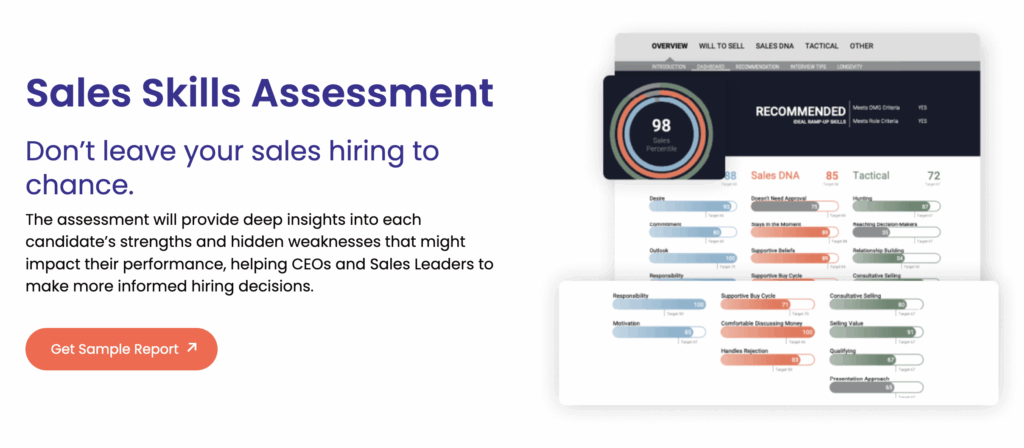
But you can find a detailed list of the top 20 sales assessments here.
Third, use a combination of a sales assessment along with structured interviews. At the end of the day, this technology works best when it’s used in conjunction with the human touch. So it’s ideal to identify the top three or four candidates out of the pool and engage with each of them one on one. This should help you dial in on who would truly be the best fit.
Finally, be sure to track your results and continually refine your system as you gather more data. Doing so should work out the kinks and, in time, get it working like a well-oiled machine.
Wrapping Up
There’s a lot of great technology that can enhance sales recruiting. But pound for pound, sales assessments may be the most potent. It’s just a matter of understanding how they work and how to harness their power to assemble the ultimate sales team.
Ready to take the next step? Get started with The Sales Skills Assessment today.

